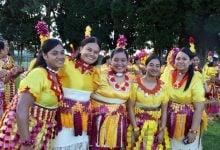
New language resources have been released to support Pasifika new entrants in New Zealand schools.
The resources comprise 100 dual-language flip books, audio and online resources in five Pasifika languages – Samoan, Tongan, Tokelauan, Cook Islands Māori and Niuean – and English, as well as supporting materials for teachers and parents.
“These resources will help our youngest Pasifika students to thrive and succeed at school. They are designed to build on the strengths of Pasifika new entrants’ existing language skills to support the development of their English language and literacy skills, and their transition to English medium schools,” says education minister Hekia Parata.
“Maintaining their language and using it alongside English will help Pasifika children reach their full potential. The bonus is that as well as improving their English, these resources help Pasifika children stay connected to their culture, history and heritage,” says Pacific Peoples’ minister Peseta Sam Lotu-Iiga.
“Development of these resources has already resulted in wonderful collaboration between the Ministry for Pacific Peoples, the University of Auckland and the Pacific community.”
A selection of the resources was piloted in seven South Auckland schools by a team of academics led by Dr Rae Si’ilata. The pilot found that students’ achievement, confidence and self-esteem in English language and literacy increased after six months at school, while teachers reported gaining valuable insights into how to further develop their literacy and language teaching skills.
Parent trials were also held in clusters of Auckland schools, led by Pasifika languages consultant Patisepa Tuafuti. These trials received high praise from schools, parents and students who responded enthusiastically to being able to share and learn new ideas about language and literacy in a culturally responsive way.
The Pasifika dual language resources can be ordered free of charge from the Ministry of Education’s Down the Back of the Chair catalogue and online from the Ministry’s Te Kete Ipurangi (TKI) web platform.









